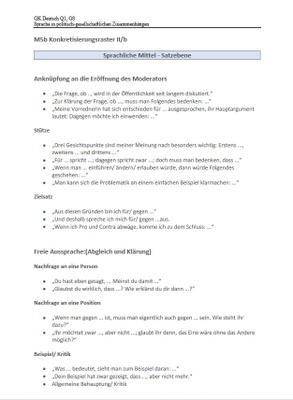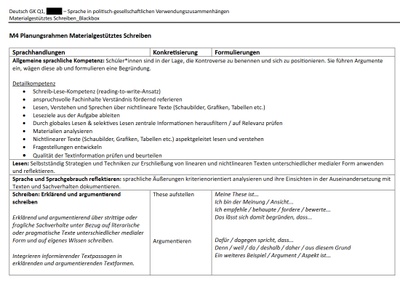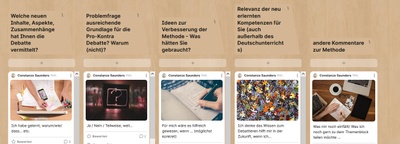High School: Debating/ Argumentation & text-based writing
Project description for lesson development “Teaching academic language in a motivating way"
Title: "Language education on the skills of debating/argumentation and text-based writing"
Development goals
- Promotion of academic language skills in upper secondary level German for debating/argumentation and text-based writing
- Making the acquisition of academic language skills transparent and therefore motivating
Teaching measures
Sub-project 1) Debating/argumentation
As part of a series of lessons, the pupils first analyzed a debate in terms of content and language using video material, defined criteria for successful argumentation (in plenary discussions and in partner work with the help of worksheets), clarified the course of a debate, specified requirements for (successful) pro-con debates and were taught linguistic means at word and sentence level (see working material 1, in German). In the last point, which focused specifically on linguistic education, the so-called “concretization grid” (cf. Hägi-Mead & Tajmel, 2023; see Material 1: M4, M5, both in German) played a central role.
Material 1: Preparing the debate with a concretization grid
When conducting the debate, the pupils watching were supposed to, among other things, pay attention to the speakers' implementation of the requirements, including the linguistic ones (see Material 2, M8, in German).
Material 2: Conducting the debate
The results of the debate were evaluated in a discussion with the pupils in a later lesson.
Sub-project 2) text-based writing
In this second series of lessons, writing based on a read text was taught and practiced; the teacher used the so-called “planning framework” (cf. Hägi-Mead & Tajmel, 2023) both in the planning and in the implementation of the lessons.
Material 3: "Planning framework" for material-based writing (2 pages)
Accompanying research/ evaluation
Sub-project 1) Classroom visits were carried out by the project manager/researcher and three student teachers; on the day of the debate, they analyzed the debate from a linguistic perspective using an observation sheet developed in advance together with the teacher. The observers were also able to document specific linguistic formulations of the students, which the teacher, as moderator of the debate, was not able to do at the same time.
Research instrument: observation sheet
As part of a later lesson to evaluate the debate and the method, the pupils first assigned different known formulations taken from the debate to the 5 linguistic competencies defined for the series (active listening, evaluating, taking a critical stance, discussing/dealing with arguments, checking/verifying), the formulations were then assigned to the various linguistic competences (securing results). Afterwards, the pupils' impressions and suggestions for improvement regarding the series of lessons were collected on a padlet.
Figure 1: Padlet for pupil feedback
Sub-project 2) In the following lesson, the teacher discussed with the pupils their impressions of their learning outcomes and collected suggestions for improving the teaching methodology.
Results
Sub-project 1) The observation of the debate generally showed a good linguistic implementation of the formulations practiced, although the pupils' focus of attention seemed to be primarily on finding (counter) arguments. Everyday language was often used in this case. The prepared statements at the beginning of the debate in particular featured appropriate linguistic formulations - the written preparation made this possible. In addition to key words, this included, for example, stylistically effective inversions and “if... so [then]” formulations.
The pupils' feedback in the evaluation session related primarily to the technical content they had learned and its transfer to other contexts, including their own linguistic development. Above all, they would have liked a free choice of speaker order for the debate (this was given); there were no suggestions for better linguistic preparation.
Sub-project 2) The pupils told the teacher that the formulations on the planning framework had helped them to prepare, develop and mutually evaluate the texts produced. Despite a relatively short introduction by the teacher and the fact that this format had not yet been practiced in this way, they felt quite confident in using it, cf. for example this feedback: "Operators and corresponding formulations were very helpful for my text design and also for correction". Some of them were even surprised at how well they were able to implement this complex task using the materials. For the future, they would like to see similarly transparent materials with regard to the linguistic requirements.
References
Hägi-Mead, S., & Tajmel, T. (2023). Sprachbewusstheit und Mehrsprachigkeit in der Unterrichtsplanung. In A. Wildemann & L. Bien-Miller (Eds.), Sprachbewusstheit: Perspektiven aus Forschung und Didaktik (pp. 451–490). Wiesbaden, Heidelberg: Springer VS. https://doi.org/10.1007/978-3-658-39229-1_13



